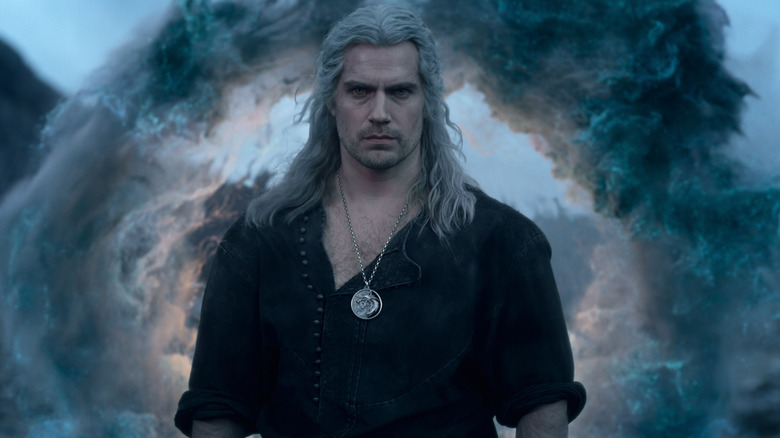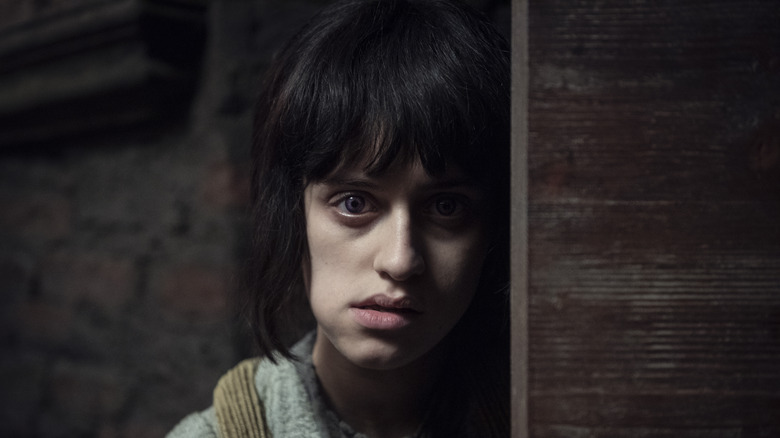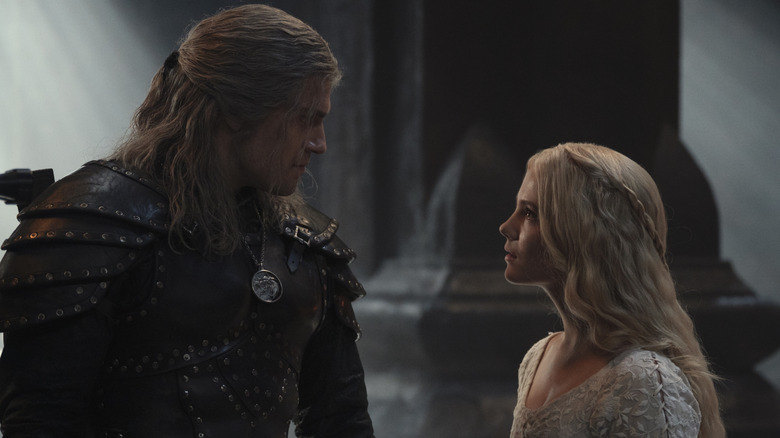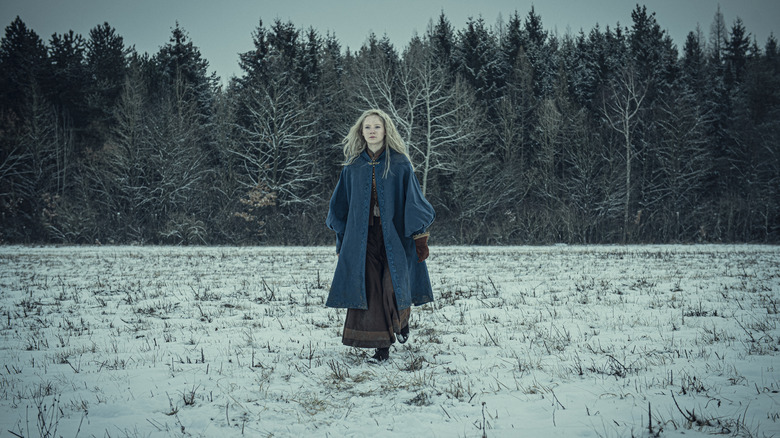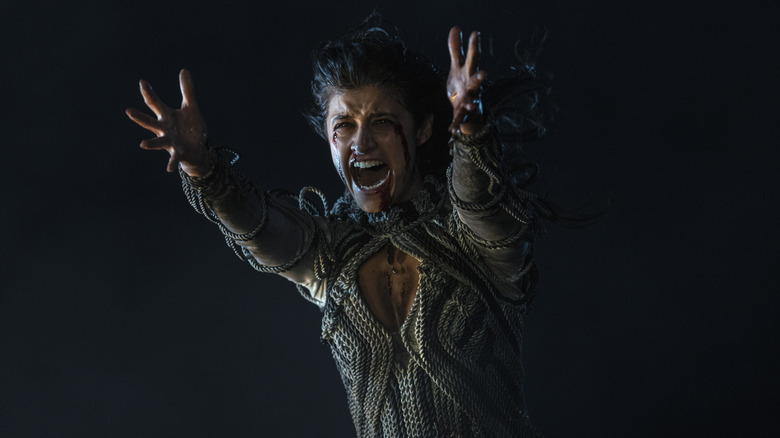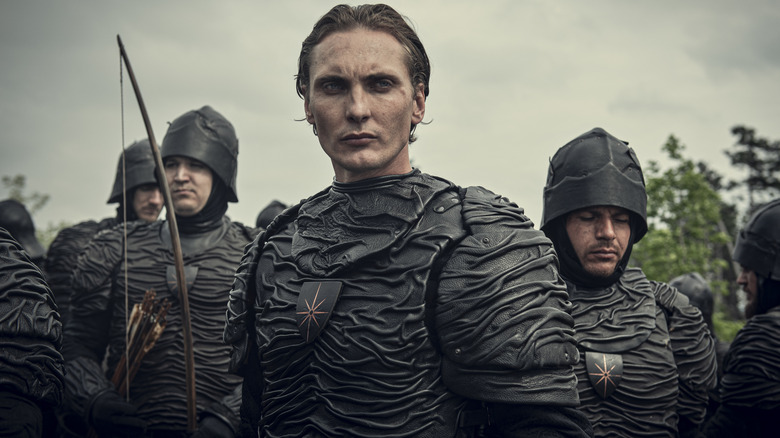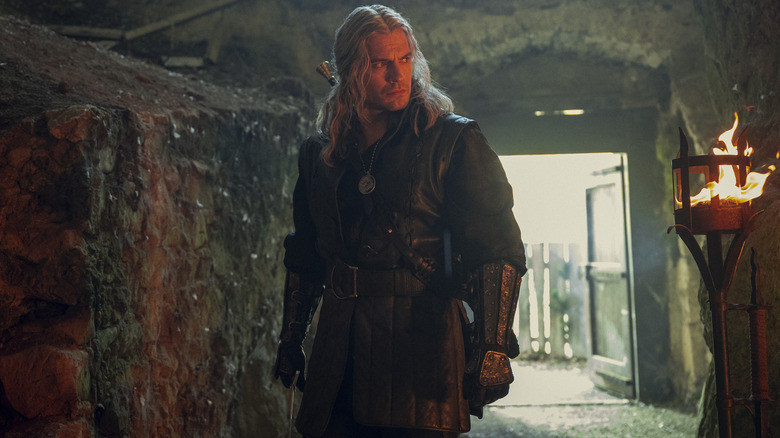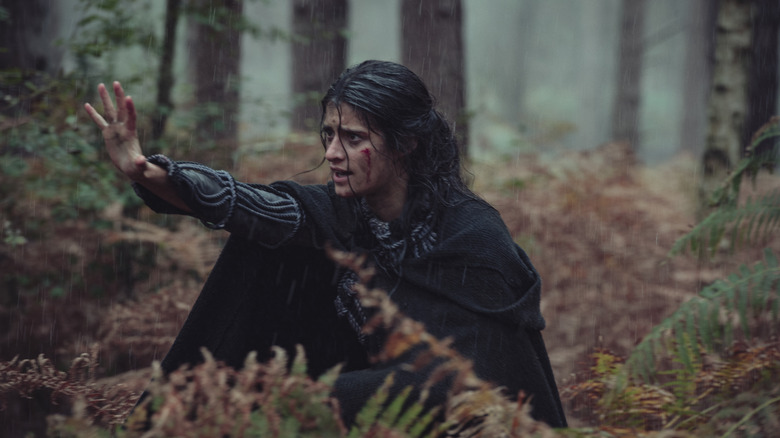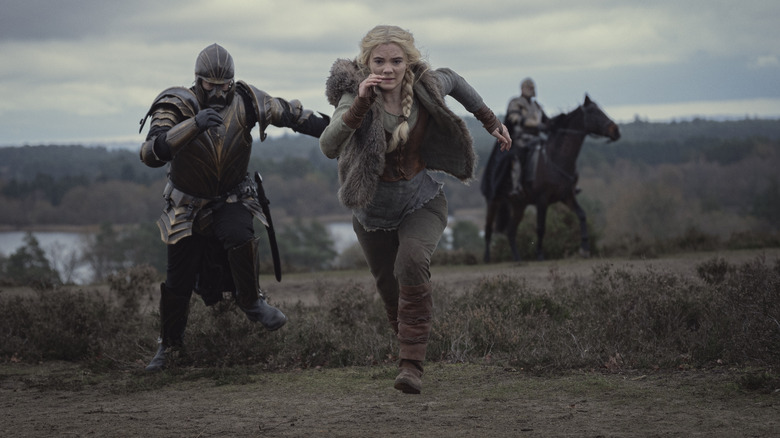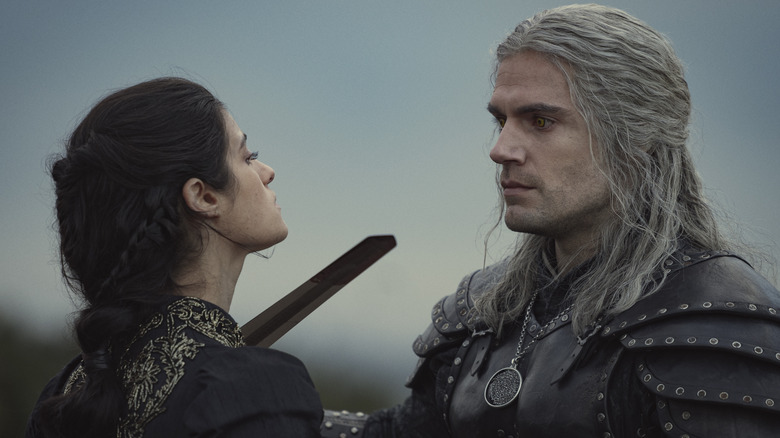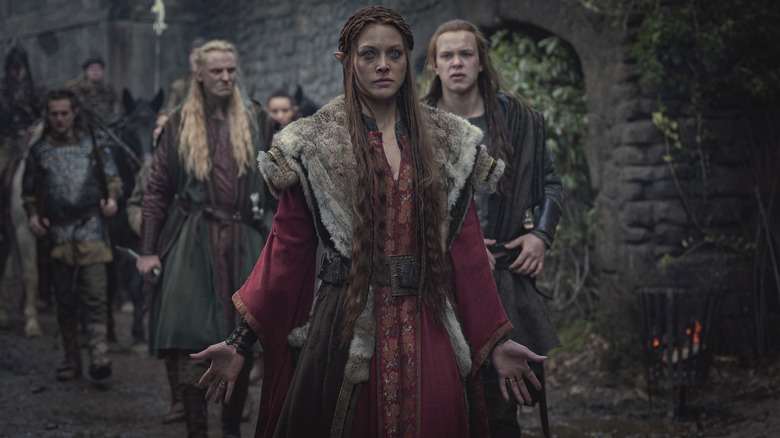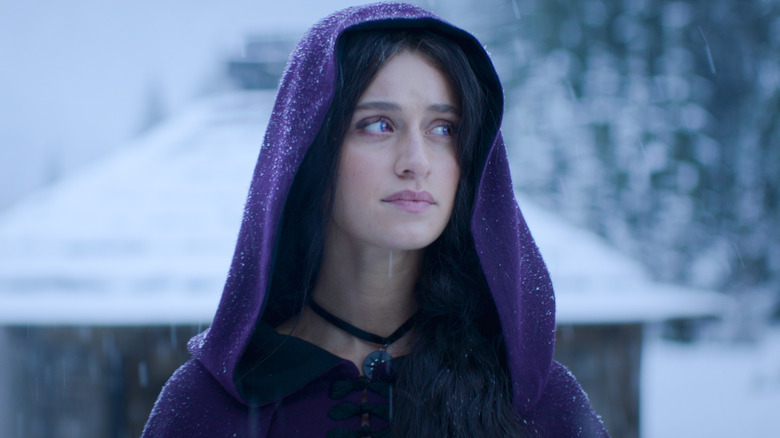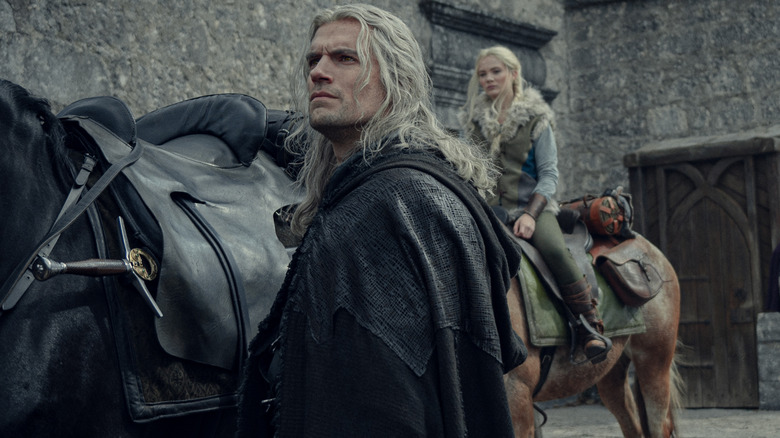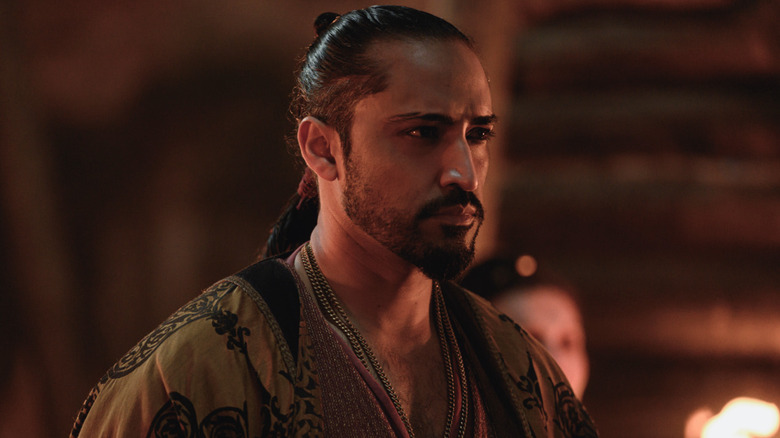The Witcher Season 3 Volume 2: A No-Nonsense Series Recap Before You Watch
Season 3 Volume 1 of "The Witcher," Netflix's ongoing live-action adaptation of Andrzej Sapkowski's written work, is upon us, and that means a few important things. First, it means that Netflix is still toeing the line between a standard, weekly release schedule and the binging model that the streaming titan is classically associated with, with the first five episodes of Season 4 dropping on Thursday, June 29, and the remaining three dropping four weeks later, on Thursday, July 27.
It also means that Henry Cavill's time as the titular Geralt of Rivia is almost over. After Season 3, Liam Hemsworth will become the new Witcher on a show that could very well run for at least four more seasons. So for those keen on engaging with the story before Cavill's premature departure (and there's quite a bit of story here to engage with), here's a no-nonsense, crash course in Netflix's live-action adaptation of "The Witcher."
Season 1: Yennefer's ascension to power
Yennefer of Vengerberg (Anya Chalotra) is a part-human, part-elf sorceress who began her life on the outskirts of Vengerberg. Born with a curved spine and partial facial paralysis, she was loathed and mocked by everyone, including her own family. She discovered that she possesses the ability to use magic when she created a portal to escape the abuse of the other villagers.
The surfacing of Yennefer's latent power caught the eyes of Aretuza, an academy devoted to the study of magic. And although she initially fought against having her life upheaved, she became a powerful sorceress under the stern tutelage of Tissaia de Vries (MyAnna Buring).
Yennefer's first act as a full-fledged mage was to enlist an enchanter to alter her physical form so that could finally feel beautiful. It was not a painless process, but it garnered her another weapon in her rapidly growing arsenal. And make no mistake — her beauty becomes a weapon, an effective one that she wielded to gain political favor.
For decades, she treated the world and everyone in it with the same harshness that had been offered her. Yennefer held no loyalties beyond herself because she dared not trust anyone, not even Istredd (Royce Pierreson), with whom she had an on-again, off-again relationship. Then Geralt came along.
Season 1: Geralt's fated journey to fatherhood
In Season 1, Episode 1, "The End's Beginning," Geralt meets Princess Renfri (Emma Appleton), who foretells his future in that he will meet a "girl in the woods." Stubbornly, Geralt ignores her, claiming that fate does not exist. Decades later, in Season 1, Episode 4, "Of Banquets, Bastards and Burials," Geralt accompanies Jaskier (Joey Batey) to a royal betrothal. While his presence there is only meant to protect the bard from the fallout of his numerous sexual exploits, he ends up saving the man Princess Pavetta (Gaia Mondadori) intends to marry, Duny (Bary Edwards). At Duny's insistence, Geralt jokingly invokes the Law of Surprise as his reward. And it seals his fate.
The Law of Surprise is a tradition in the world of "The Witcher" that essentially allows a person to lay claim to a prize that the debtor does not yet know they possess. In Geralt's case, by invoking the Law of Surprise, he lays claim to Princess Cirilla of Cintra (Freya Allan). When it becomes clear to him what he has done, Geralt resolves never to return, but fate is not on his side. Nilfgaard, a neighboring kingdom, attacks Cintra, putting Ciri in great danger and thus drawing Geralt into the conflict. She escapes the siege, and eventually, Geralt finds her wandering in the woods. Just as Renfri predicted all those years ago.
Season 1: Ciri's reluctant and messy flight
There's no better case for how confusing "The Witcher" timeline can be than how it handles Ciri, who's introduced as a young but fully cognizant child in the same episode that introduces Geralt. Like the White Wolf and Yennefer too, Ciri is burdened by demons early in life, having lost both of her parents to the sea. In their place, she is raised by her grandparents, the ruling king and queen of Cintra, but she loses them as well when Nilfgaard attacks the kingdom. Before Queen Calanthe (Jodhi May) dies, she witnesses Ciri unintentionally use magic, so with her last breath, she bids Ciri to seek out Geralt and accept her destiny.
Aided by Mousesack (Adam Levy), a druid advisor to the late king and queen of Cintra, Ciri flees her home as the Nilfgaardians raze it to the ground. But they are quickly separated, and Ciri's dangerous magic, which becomes explosive with her rage and fear, prevents anyone else from coming to her aid. She is on her own. As she searches for Geralt, Ciri discovers just how fractured the Continent, the primary landmass on "The Witcher," really is. Humanity has either enslaved or slaughtered elves, and nations are prepared to destroy everything and everyone if it means gleaning an extra ounce of power. But fate and no small amount of grit keep Ciri alive, and finally, she finds Geralt, the man her grandmother promised would bring some semblance of stability to her life.
Season 1: Yennefer's sacrifice
As the story nears its first bookend, "The Witcher" depicts its final key event: the Battle of Sodden Hill. Vilgefortz of Roggeveen (Mahesh Jadu), a gallant mage and member of the Brotherhood of Sorcerers, convinces Yennefer to come back to Aretuza by telling her that he and Tissaia need her help. Although Yennefer arrives only to find that Tissaia had no idea that Vilgefortz went to recruit her, she agrees to help Cintra in the impending battle against Nilfgaard, a battle that, as fate would have it, takes place on Sodden Hill, next to the woods where Geralt and Ciri finally unite.
The battle in Season 1, Episode 8, "Much More," is brutal. Magic and metal clash, and many die. But it could have been much worse for Cintra were it not for Yennefer, who channels an immense amount of fire magic, decimating the Nilfgaardian forces and ultimately winning the fight. But the act requires so much of Yennefer that she collapses. Having vanished from the battlefield, she is presumed dead by the Cintran defenders. And no one learns otherwise until Season 2.
Season 1: Loose ends, bloody politics, and fantasy racism
"The Witcher" also features a few subplots to better flesh out its decaying world, and Season 1 funnels a lot of this through Cahir (Eamon Farren), a Nilfgaardian knight tasked by his empire to kidnap Ciri. Nicknamed the Black Knight, Cahir lives by the belief that almost every problem can be solved with a knife or a sword.
Another constant thorn in everyone's side is Stregobor (Lars Mikkelsen), a racist wizard who derives most of his pleasure from killing and torturing women and elves, the former in the name of science, the latter in the name of his own twisted belief system. He's a member of the Brotherhood of Sorcerers, and he uses that political power to further his personal brand of eugenics. And when he doesn't get his way, he spins the story so that he does anyway.
And finally, it's worth mentioning that there are two other sorceresses who help shape Season 1: Fringilla Vigo (Mimi Ndiweni) and Triss Merigold (Anna Shaffer). Fringilla, who became an equally ambitious sorceress alongside Yennefer, lends her power to Nilfgaard and aids in the destruction of the Continent. Triss, on the other hand, has been a sorceress for a bit longer and uses her power to protect the innocent whenever she can.
Season 2: Geralt's fated journey to fatherhood continues
Season 2 picks up exactly where Season 1 leaves off. After finally finding Ciri, Geralt seeks out Yennefer in the aftermath of the Battle of Sodden Hill only for Tissaia to all but confirm her death. Riddled with grief, Geralt begins the long journey to take Ciri to Kaer Morhen, the ancestral home of the Witchers. There, we meet Vesemir (Kim Bodnia), who is reluctant to welcome Ciri at first but quickly grows fond of her.
Wanting to find purpose, Ciri has her heart set on becoming a Witcher, if not in genetics, then at least in skill. However, Geralt is hesitant, only relenting when a fellow Witcher succumbs to a horrible poison that causes him to pose a threat to the other Witchers. Slowly but surely, Geralt grows attached to Ciri, going so far as to bring Triss to Kaer Morhen to help her control her magic. This is crucial because Geralt has witnessed Ciri's powers and knows the dangers they could bring if left unchecked.
Even more importantly, Geralt is focused on her personal well-being. He sees her pain and the rage she nurtures against Cahir. And so he teaches her the lesson that he's been practicing for the entire series: Witchers don't kill out of fear. Witchers kill to save lives.
Season 2: Yennefer's fall from power
To Yennefer's surprise, she isn't dead. However, she awakes in Nilfgaardian custody, where she quickly realizes two horrible realities: One, Fringilla only allowed her to live because she intends to sacrifice her to the White Flame as an apology for losing the Battle of Sodden Hill, and two, channeling so much fire magic at once severed her connection to Chaos, another term for "magic" on "The Witcher."
But things get worse. Yennefer and Fringilla are captured on the journey back to Nilfgaard by the forces of Francesca Findabair (Mecia Simson), an elven sorceress. The three women realize that they are all having similar vivid dreams that lure them to Voleth Meir (Ania Marson), aka the Deathless Mother, a dark elf who feeds on suffering. Voleth Meir promises Yennefer that she will restore her magic if she brings Ciri to her.
Unwilling to sacrifice an innocent girl, Yennefer initially resists temptation but ultimately gives in because she craves the power she once possessed. And so she sets out to find Ciri, at first not knowing that she is seeking Geralt's Child surprise. Although she eventually learns of the connection between them, she chooses to press on, turning back only at the last second.
Season 2: Ciri's Elder blood
During her training at Kaer Morhen, Ciri has to fight for a seat at the table, with the other Witchers mocking her whenever Geralt isn't around to keep them in line. However, her determination surpasses her pain, and her abilities surpass her determination. The only problem is that she can't always figure out how to harness those abilities.
Vesemir discovers that Ciri possesses Elder blood, the key ingredient in the elixir required for the Trial of the Grasses, which is what Witchers call their excruciatingly painful mutation process. Ciri is seconds away from beginning the trial when Geralt bursts in and talks her out of it, convincing her that she does not need to be a Witcher to master her abilities.
Eventually, Yennefer joins Ciri's circle of mentors, and it is with her impassioned guidance that she learns first to create a portal and then to repair a bridge that spans a wide chasm. Her progress is cut short, however, when Yennefer admits her deception. In her rage, Ciri shatters the world around her with magic.
Season 2: The Deathless Mother and Battle of Kaer Morhen
Although Yennefer doesn't go through with the Deathless Mother's offer, Voleth Meir is able to escape her prison in the woods, a prison that Witchers designed for her years ago, anyway thanks to Emhyr var Emreis' (Bart Edwards) order to kill Francesca's baby, causing the elf so much pain that the demon is set free. Voleth Meir wastes no time, immediately infiltrating Kaer Morhen, possessing Ciri, and slaughtering many Witchers in their sleep.
After learning that the demon needs a host body to exist on their plane, Yennefer offers herself instead, slitting her wrists to cause herself so much pain that the Deathless Mother cannot resist. Finally free, Ciri opens a portal to the Deathless Mother's realm, where she takes herself, Geralt, and Yennefer exactly long enough for the demon to unbind herself from Yennefer and claim a connection to the Wild Hunt, thus setting up the antagonists of Season 3.
Season 2: More loose ends, bloody politics, and fantasy racism
At some point unseen, Jaskier dons the nickname the Sandpiper and begins aiding elves fleeing to Cintra, one of the few comparatively safe havens for their kind. We are also introduced to Sigismund Dijkstra (Graham McTavish), an advisor to King Vizimir of Redania (Ed Birch) with a cunning and evil mind.
Cahir returns for a new story arc too, which begins with his imprisonment at Aretuza and ends with his imprisonment in Cintra. Fringilla and Francesca also get their own subplot, which depicts the pair starting off using each other for their own gain and ending up becoming genuine friends. Fringilla is ultimately imprisoned alongside Cahir for her betrayal, and Francesca ends up in the woods, where she discovers the existence of Ciri thanks to Istredd.
Season 2 also introduces Rience (Chris Fulton), a mage who specializes in fire magic and is tasked with capturing Ciri. Rience enjoys his work, especially the torture-for-information aspect, which he practices on Jaskier until Yennefer douses his face in alcohol-fueled flames. He doesn't die, but it does leave him very, very angry.
Season 3 Volume 1: Yennefer's redemption
Contains spoilers for "The Witcher" Season 3 Volume 1
Yennefer breaks Geralt and Ciri's trust. While she regains her connection to Chaos thanks to her sacrifice in the battle at Kaer Morhen with the Deathless Mother, she still has a lot to do if she wants to ever feel whole again. So in Season 3 Volume 1, Yennefer puts in the work to earn her found family back. She trains Ciri. She writes daily letters to Geralt. She verbalizes her numerous apologies and outlines the steps she will take to make everything better. And eventually, it pays off and she rekindles her relationship with the White Wolf.
But that's not the extent of her efforts. Yennefer also takes Ciri to Aretuza, where she genuinely believes, despite the academy's questionable behavior toward pupils who stumble, that Ciri will grow into the powerful sorceress that Yennefer knows she's capable of becoming. This does end up causing a rift between the two since Yennefer is more comfortable in snobby political circles than Ciri is, but Geralt steps in to smooth that tension.
Yennefer also pushes for unity within the Brotherhood to protect the North against further incursions from Nilfgaard. And despite opposition from mages like Stregobor, the majority sides with Yennefer to foster peace, including Tissaia and seemingly, Vilgefortz.
Season 3 Volume 1: Geralt's neutrality
Witchers don't take sides, and Season 3 Volume 1 of "The Witcher" puts that rule system to the test by surrounding Geralt with people who insist upon his official camaraderie. Jaskier insists that Ciri would be safer under the protection of Redania. Vilgefortz insists that Geralt must join the conclave against Nilfgaard. Geralt rejects both of these offers without consideration because his neutrality isn't just what he was instructed to adhere to as a Witcher; he genuinely believes in it.
But Geralt also understands that Ciri could never stay neutral, not because so many forces are interested in her future but because she cares too much about the world around her and the people in it. And he accepts this, assuring her that her path is for her to choose and her alone, even if the path she chooses takes her back to the Cintran throne. And whatever she chooses, he promises to support her.
And that's because Geralt supports people, not regimes. When Yennefer puts her plan to unite the conclave in motion, Geralt accompanies her. Because while he isn't interested in the politics of it all, he wants to ensure Yennefer's safety. As Geralt well knows, few places are more dangerous than a gathering of the ambitious social elite.
Season 3 Volume 1: Vilgefortz's treachery
In celebration of Yennefer's proposed peace, the conclave hosts a grand celebration. Almost everyone is in attendance: Yennefer, Geralt, Tissaia, Vilgefortz, Stregobor, Dijkstra, Phillipa Eilhart (Cassie Clare), Istredd, Prince Radovid (Hugh Skinner), and then some. On the surface, the event is genial and refined, but just below that brittle mask is a current of schemes and plots ... the worst of which belong to Vilgefortz. Fans of the novels and the games have long since known that Vilgefortz is not the man he purports to be in the Netflix adaptation, but it is not until the very end of Season 3, Episode 5, "The Art of the Illusion," that he is revealed to be a villain.
Vilgefortz has been steadily accruing power ever since Season 1, becoming the highest-ranking member of the Brotherhood of Sorcerers. He's also won Tissaia's heart, along with her trust. In Season 3, Geralt assumes that the plot to replicate Ciri's powers in part-elven novices is Stregobor's doing because the man has proven he has no qualms when it comes to experimenting on innocent human beings, especially girls. But the plot is not his; it's Vilgefortz's. Season 3 Volume 1 ends with Geralt and Yennefer connecting the dots that lead to their former ally. Presumably, Season 3 Volume 2 will open with the pair figuring out how to wield this information.
